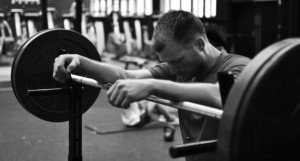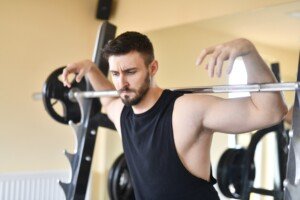You can solve the problem of passing out while exercising once you know what’s causing it, & this may include heart problems or diabetes which can creep up on a person.
I was a personal trainer for five years at a major health club, and I can recall two clients who nearly passed out while exercising.
One was a young woman who was a bit underweight. She was just about to faint right after completing a set (she was on her feet) and I steadied her and sat her down.
This was during the dinner hour, and I asked her if she had eaten anything earlier that day.
She said no. She had come in for her session in a fasted state, with few fat reserves in her weak (though young) body to draw energy from.
Compounding the issue was that her body was untrained, de-conditioned. I also doubted she’d had any water prior to the session.
The other client who had nearly passed out while exercising had eaten earlier in the day.
But he pushed himself like a tiger very hard through the session, and finally, his body just gave out and he had to sit down and lower his head to the table, claiming he felt very light-headed.
Though he was in better shape than the other client, it’s all relative; he had pushed himself too hard for what his body could handle.
One of the most common reasons people feel as though they’re going to pass out while exercising is because they are out of condition.
And then they one day push themselves harder than ever before — being uncharacteristically motivated (i.e., a man in his first session with a personal trainer).
Combine that with lack of hydration and especially insufficient nourishment, and you have a potential setup for passing out during the exercise or right after a set is completed.

These are individuals who are either brand new to exercise, or, the level of exertion is significantly greater than what they’re used to.
It’s easy to say, “I nearly passed out during my exercise today; I was flipping tractor tires in the parking lot — it was 85 degrees — I wasn’t drinking enough water — all I’d had that day was a bowl of cereal — four hours before the workout.”
Another possible cause is training at an altitude much higher than what the person is accustomed to — such as someone who lives at sea level and visits a high-altitude city and does some hard hiking at 7,000 feet above sea level.
But there may be a medical reason why passing out while exercising has become an issue.
This is especially possible if at least one of the following circumstances applies to the exerciser:
• The passing out, or feeling of imminent fainting, during the exercise, occurs despite that person having been well-fed and well-hydrated.
• The exercise takes place in a well-ventilated room; ambient heat is not an issue.
• The trainee’s body is already used to working out, and the activity that precedes the faint feeling is either pretty much the norm for that person, or only a little bit more intense than usual.
• Other symptoms accompany the episode or precede it, such as chest pain or dizziness.
Feeling dizzy (the room is spinning) is not the same as feeling faint.
There’s really quite a few conditions that can bring on a feeling of faintness while in the middle of exercise. Pregnancy is one.
Here are some more:
• Low blood pressure
• Low blood sugar
• A heart problem such as arrhythmia
• Side effects of medications
A depletion of the minerals sodium and magnesium may also make the exerciser feel faint, says Carolyn Dean, MD, ND, Medical Advisory Board Member, Nutritional Magnesium Association at nutritionalmagnesium.org.
Dr. Dean also says that not breathing deeply enough could cause a faint feeling.
Obviously, if you experience an episode of feeling on the brink of passing out, do not resume the exercise, even if you just guzzled water and had a candy bar.
But next workout session, make sure you’re hydrated and have some carbs in your system, if you firmly believe that these are the variables.
If you can’t figure out why you nearly passed out while exercising, however, don’t take a chance by blowing it off.
You should see a doctor to find out if there is an underlying medical cause.




























